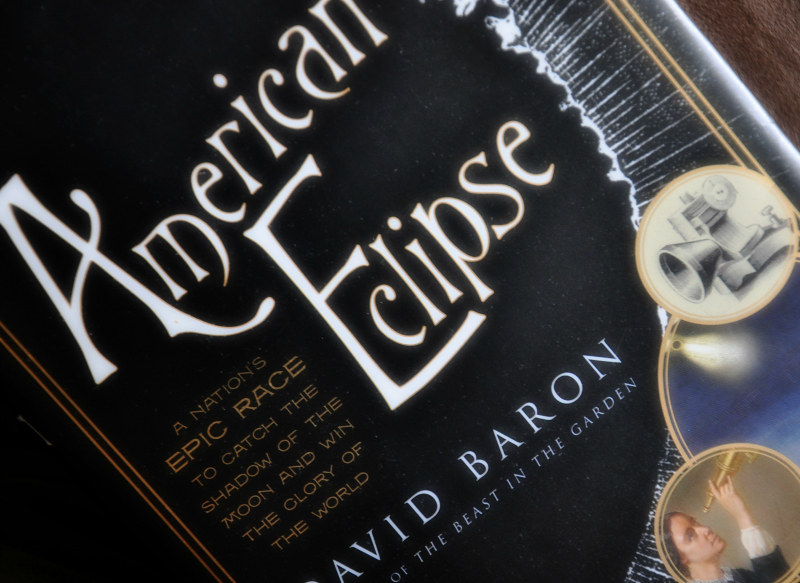Our house is in the path of totality. Our state is preparing for an apocalypse. [grin]
As we’re gearing up for this momentous experience, we’re doing a little light reading (what else?). Levi finished American Eclipse about the 1878 eclipse in the West and said it was wonderful. As soon as I finish this blog post, I’ll be cracking it open beyond the first few pages.
I did happen to glance at the page sandwiched between the preface and the prologue. On that page is an artistic image of a sun and moon and this quote:
Eclipses suns imply.
–Emily Dickinson
I had to read it multiple times before my brain registered the words, the poetic so out of order in our pedestrian culture.
When her meaning hit my brain, I immediately thought of a C.S. Lewis quote:
“The Christian says, 'Creatures are not born with desires unless satisfaction for those desires exists. A baby feels hunger: well, there is such a thing as food. A duckling wants to swim: well, there is such a thing as water. Men feel sexual desire: well, there is such a thing as sex. If I find in myself a desire which no experience in this world can satisfy, the most probable explanation is that I was made for another world. If none of my earthly pleasures satisfy it, that does not prove that the universe is a fraud. Probably earthly pleasures were never meant to satisfy it, but only to arouse it, to suggest the real thing. If that is so, I must take care, on the one hand, never to despise, or to be unthankful for, these earthly blessings, and on the other, never to mistake them for the something else of which they are only a kind of copy, or echo, or mirage. I must keep alive in myself the desire for my true country, which I shall not find till after death; I must never let it get snowed under or turned aside; I must make it the main object of life to press on to that country and to help others to do the same.”
It turns out eclipses can cause existential pondering. Check out this astonishing essay, ‘Total Eclipse,’ by Annie Dillard. In it she recounts her experience of the 1979 total eclipse. [The essay link will only be available until August 22, so go read it now!]
The white ring and the saturated darkness made the Earth and the sky look as they must look in the memories of the careless dead. What I saw, what I seemed to be standing in, was all the wrecked light that the memories of the dead could shed upon the living world. We had all died in our boots on the hilltops of Yakima, and were alone in eternity. Empty space stoppered our eyes and mouths; we cared for nothing. We remembered our living days wrong. With great effort we had remembered some sort of circular light in the sky—but only the outline. Oh, and then the orchard trees withered, the ground froze, the glaciers slid down the valleys and overlapped the towns. If there had ever been people on Earth, nobody knew it. The dead had forgotten those they had loved. The dead were parted one from the other and could no longer remember the faces and lands they had loved in the light. They seemed to stand on darkened hilltops, looking down.
And,
The mind wants to live forever, or to learn a very good reason why not. The mind wants the world to return its love, or its awareness; the mind wants to know all the world, and all eternity, and God. The mind’s sidekick, however, will settle for two eggs over easy.
Her very last paragraph struck me to the bone. Do we turn “at last even from glory itself with a sigh of relief”?
I just want to quote all of Lewis’s essay ‘The Weight of Glory’ here, but I can’t so go read it. (In ‘The Weight of Glory,’ Lewis revists the idea that ‘food hunger implies,’ not that we are guaranteed to have it or enjoy it.)
Indeed, if we consider the unblushing promises of reward and the stagering nature of the rewards promised in the Gospels, it would seem that Our Lord finds our desires not too strong, but too weak. We are half-hearted creatures, fooling about with drink and sex and ambition [and two eggs over easy] when infinite joy is offered us, like an ignorant child who wants to go on making mud pies in a slum because he cannot imagine what is meant by the offer of a holiday at the sea. We are far too easily pleased.
Have you read The Great Divorce? It’s a picturesque vision of how terrifying glory can be, and how many turn from glory itself with a sigh of relief.
“Will you come with me to the mountains? It will hurt at first, until your feet are hardened. Reality is harsh to the feet of shadows. But will you come?”
Will you come?


No comments:
Post a Comment